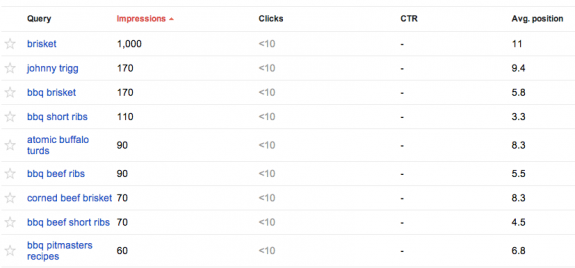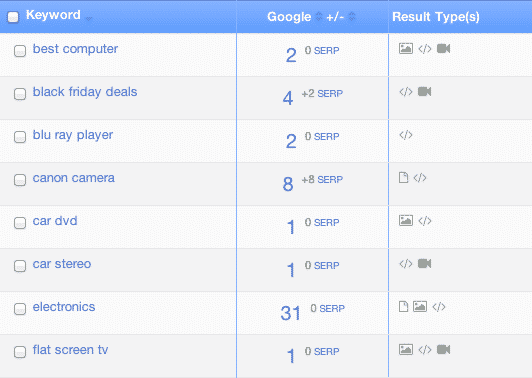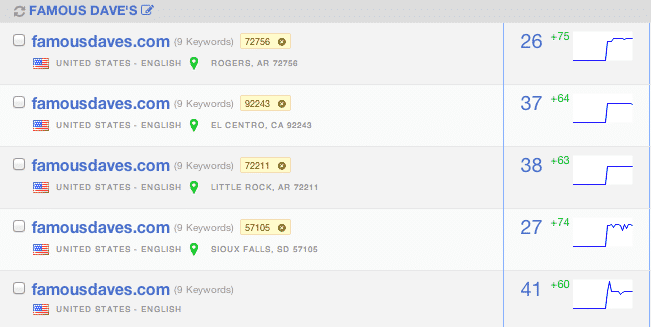If you’re not already using Google Webmaster Tools (GWT), you may be missing out on some great data on how your sites are seen by Google. Whether it’s for notifications of malware being found, crawl issues, tools to check structured markup, or numerous other tools available in there it’s definitely worth using. They even offer a “Search Queries” report which is a very stripped down and basic way to check on how you’re ranking on a limited set of keywords. While that may suffice for some, it leaves a lot to be desired and is even potentially misleading data.
You Should Be Tracking Separate Geographic Locations
If you’re doing SEO for a company that relies on ranking well within localized results, it’s probably in your best interest to just ignore ranking data in GWT. Let’s say you have a chain of restaurants that are spread out across numerous cities. You should be tracking each city separately to make sure your SEO campaigns are working. Looking at the data as a whole will potentially be misleading and skewed. Sure, you can add location modifiers to a term and get somewhat of an idea but if you’re Famous Dave’s, wouldn’t you want to know where you’re at for [bbq restaurant] in each city you have restaurants?
GWT Doesn’t Differentiate Between Universal Results and Standard Organic Results
Did you know that the “Avg. Position” in GWT factors in universal results as a position? If you have an image that shows up in an image pack from time to time, that gets counted as a #1 ranking. Don’t get me wrong, that’s definitely not a bad spot to be in but it skews the data to the point where it’s unusable if you’re targeting typical organic rankings.
You Need to Know Which Result Types are Showing in the SERPs
Over the past few years, images, videos, places, news, and other “universal result” types have been mixed into the SERPs. It’s critical to monitor which of these are showing in your target keywords so that you are able to respond accordingly. If there are videos showing in the SERP for a major term, it’s time to start working on some videos. This is a key piece of data that’s missing and should not be neglected.
Lower Traffic Sites Will Have Limited Data
Most sites on the internet are not getting millions of views every day. In fact, many don’t even exceed a few thousand visits a day but are still crucial to a business and those few searches that do come in are enough to make a living from. In our testing, it appears that sites with fewer than 100,000 search impressions a day will typically end up with unreliable ranking data from GWT. We’ve heard this from others as well.

Low traffic, long tail terms are important
Many people target long tail terms as one of their main strategies. This can be very lucrative, especially when combining the traffic from hundreds or thousands of those terms. Unfortunately, those same terms are difficult to gather intelligence on through Google Webmaster Tools due to the low number of impressions and clicks. Even higher volume terms where you may not be on the first couple pages are going to result in very limited and unreliable ranking data.
Almost Never Enough Data for Daily Tracking
Data issues with GWT ranking data is especially apparent when looking at data on a daily basis. Nearly everything has very few impressions, very few clicks, and just can’t be looked at reliably, even on sites with hundreds of thousands of search impressions a day. It is important to monitor ranking data on a daily basis to get an understanding of what happens in the SERPs.


Tracking competitors
Competitive intelligence is an important aspect of any SEO campaign. If you’re not keeping an eye on at least the major players in your market, you’re missing out on some great insights. Maybe you’re dealing with something that’s seasonal and want to see when competing sites start their push, usually months ahead of time.
Tracking of preemptive SEO campaigns
If you’re in a market where preemptive SEO is a viable strategy, you should be monitoring rankings well ahead of any impressions or traffic to those terms. Doing SEO for a movie that comes out next summer? Maybe you’re working on building traffic for a sporting event that’s months or years from now. If nobody is searching for those terms yet, GWT won’t show any rankings. You need to know where things stack up right now and it needs to be reliable data.
Cannot reliably track keywords that don’t yet rank well
New sites, penalized sites, or sites that start covering a new topic not already on the site typically don’t rank well for key terms. These lower rankings and lower search impressions will lead to either misleading data or a complete lack of data on important keywords that need to be tracked. Very few terms outside the top 10 will result in any data at all but those that are in the 11-30 range can be some of the lowest hanging fruit out there.
If you’re not already using AuthorityLabs, sign up for a free 30 day trial and try our industry leading SERP tracking tools.


